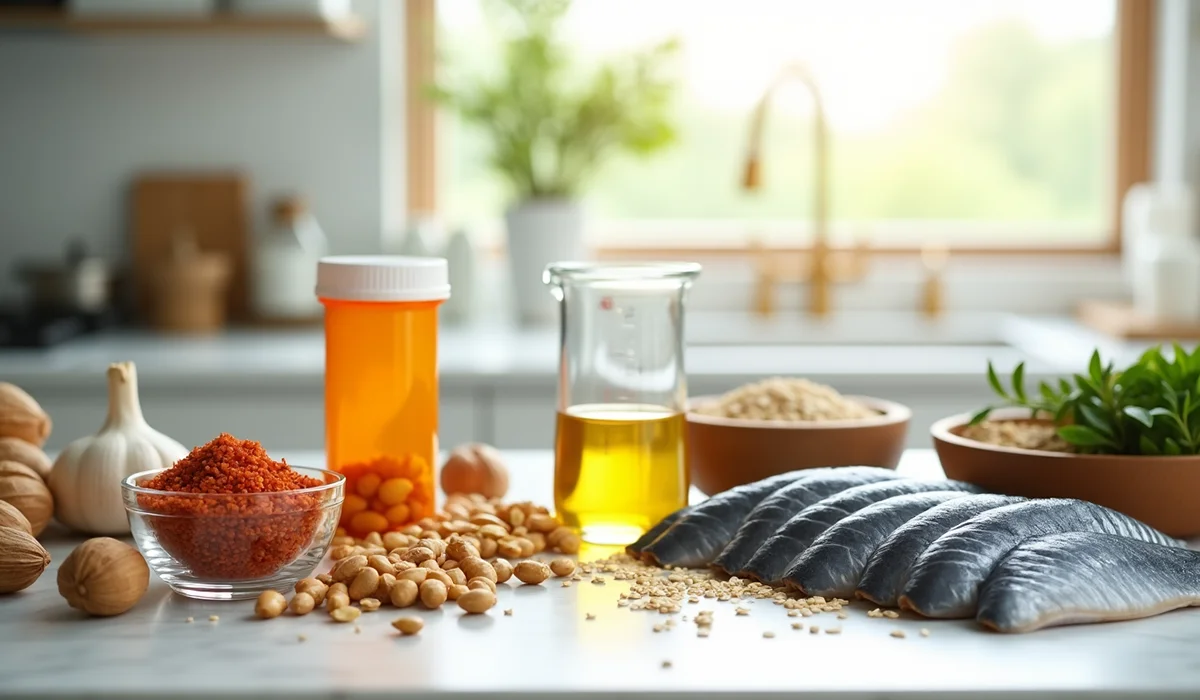The statistics are alarming – over 100 million American adults battle high cholesterol. This serious health condition claims 400,000 lives each year in the U.S. What’s more, research increasingly shows that dietary patterns play a crucial role not only in cholesterol management but also in cancer prevention and reducing cancer mortality.
Many people search for natural alternatives to statins because they worry about side effects or have different health priorities. The good news is that scientific research backs several natural methods to manage cholesterol and potentially reduce cancer mortality. To cite an instance, plant sterols can reduce LDL cholesterol by 6 to 12 percent within four weeks, while a cancer prevention diet rich in fruits and vegetables may lower the risk of certain cancers, including breast cancer and colorectal cancer.
Managing cholesterol levels naturally can be challenging, but it’s an approach that may offer additional health benefits, including potential cancer risk reduction. This detailed guide will help you explore proven alternatives. We’ll show you a functional medicine’s approach to maintain healthy cholesterol levels beyond medication, while also touching on how these strategies might impact cancer prevention. Our focus includes dietary changes, such as incorporating the best cancer-fighting foods, and research-backed supplements that may contribute to a cancer-free diet.
Would you like to take control of your cholesterol naturally while potentially reducing your cancer risk? Let’s take a closer look at your options.
Understanding the Functional Medicine Approach to High Cholesterol
Functional medicine looks at high cholesterol differently. It’s not a disease but a sign that something’s out of balance in your body [1]. This view helps us get into six main processes that can make cholesterol levels rise: metabolic dysfunction, chronic infections, gut dysbiosis, thyroid dysfunction, environmental toxins, and genetic factors [1]. Interestingly, many of these factors are also associated with increased cancer mortality, highlighting the interconnected nature of our health.
Beyond the Numbers: Why It Happens
Standard lipid markers like total and LDL cholesterol don’t tell the whole story about heart disease risk [1]. Research shows that half of all heart attack patients have normal cholesterol levels [2]. Similarly, when it comes to cancer, it’s not just about a single factor but a combination of dietary patterns, lifestyle choices, and genetic predispositions. The focus should be on finding and fixing what’s really going on instead of just treating the symptoms. This approach aligns with strategies to reduce cancer mortality and promote overall health.
Key Functional Medicine Tests for Cholesterol
Advanced lipid testing gives us a full picture of your heart health. We look at:
- LDL particle number and size
- Apolipoprotein B (ApoB) levels
- Lipoprotein(a)
- Inflammatory markers like C-reactive protein
- Metabolic markers including fasting insulin and glucose [1]
These tests can also provide insights into overall health, potentially indicating risk factors for conditions like breast cancer or colorectal cancer.
Creating Your Individual-Specific Protocol
A protocol that works needs to take many factors into account. The 2018 AHA/ACC Guidelines now support more individual-specific care. They think about factors like family history, ethnicity, metabolic syndrome, and chronic inflammatory conditions [3]. This tailored approach lets us create targeted treatments based on your test results and what’s causing the problem [3]. It also allows for the integration of strategies that may help reduce cancer mortality, such as adopting a plant-based diet or following the Mediterranean diet.
The protocol works through careful testing, fixing the imbalances we find, and keeping track of your progress regularly [1]. This step-by-step method ensures you get the best natural alternatives to statins that match your unique health needs, while potentially incorporating elements of an anti-cancer diet.
Natural Alternatives to Statins: Evidence-Based Options
Research shows several proven natural alternatives that help manage cholesterol levels and may also contribute to cancer prevention. Let’s look at the most effective options backed by clinical studies, including those that may help reduce cancer mortality.
Scientifically-Validated Supplements
Plant sterols and stanols work especially well as natural alternatives. Studies show these supplements can reduce LDL cholesterol by 6-12% in just four weeks [4]. Omega-3 fatty acids show promising results and can reduce triglycerides by 30-50% when levels are above 500 mg/dL [5]. Some of these supplements, particularly those rich in antioxidants, may also have potential benefits for cancer prevention and could be part of a cancer-fighting diet plan.
Dietary Interventions and Superfoods
We noticed that fiber-rich foods help reduce cholesterol through natural pathways. Eating 10-25 grams of soluble fiber daily substantially lowers LDL cholesterol [6]. Foods packed with omega-3s, which you’ll find in fatty fish like salmon, mackerel, and tuna, help keep cholesterol levels healthy [7]. Many of these same foods are also considered cancer-fighting foods and may contribute to reducing cancer mortality.
The Mediterranean diet works as a powerful approach for both cholesterol management and potential cancer risk reduction by focusing on:
- Whole grains and legumes
- Fatty fish (2-3 servings weekly)
- Olive oil as main fat source
- Abundant fruits and vegetables, including cancer-reducing foods like berries, tomatoes, and cruciferous vegetables
- Tree nuts and seeds
This dietary pattern is rich in phytochemicals and antioxidants, which may help in cancer prevention. It’s also a prime example of how dietary patterns can influence both heart health and cancer risk. The Mediterranean diet has been associated with lower rates of colorectal cancer and breast cancer, making it a potential best diet for cancer prevention.
Lifestyle Modifications that Lower Cholesterol and May Reduce Cancer Risk
Exercise plays a vital role in managing cholesterol and potentially reducing cancer mortality. Studies confirm that 150 minutes of moderate-intensity aerobic exercise weekly helps reduce LDL cholesterol [8]. Weight management makes a big difference – even a modest 5-10% drop in body weight can improve cholesterol numbers [8]. These lifestyle changes are also in line with recommendations for cancer prevention and may help stop cancer cells from growing.
Clinical research shows that combining these natural approaches can match the results of low-dose statins [9]. Dietary changes alone reduced LDL and total cholesterol better than just exercise [10]. All the same, diet and exercise create a mutually beneficial effect to optimize cholesterol management when combined. This holistic approach aligns with strategies to reduce cancer mortality and promote overall health, potentially benefiting cancer survivors as well.
Implementing Your Holistic Cholesterol Protocol
A systematic approach and regular monitoring will give a successful cholesterol management protocol. We focused on creating a well-laid-out strategy that combines natural treatments with existing medications, while also considering potential benefits for cancer prevention and reducing cancer mortality.
Step-by-Step Protocol Development
Lifestyle modifications are the foundations of a successful protocol. Physical activity should reach 150 minutes of moderate-intensity aerobic exercise weekly [8]. Dietary changes should reduce saturated fat intake to less than 7% of daily calories [6]. A heart-healthy eating plan, which often aligns with a cancer prevention diet, and regular physical activity can boost both natural alternatives and medications’ effectiveness [11]. This approach may also help in reducing the risk of various cancers, including breast cancer, colorectal cancer, and lung cancer.
Integration with Existing Medications
Careful coordination matters when adding natural alternatives among current medications. Research shows lifestyle changes can boost medications’ cholesterol-lowering power [11]. Natural remedies may help patients on statins maintain lower medication doses [11]. Plant sterols and omega-3s can complement existing treatments without adverse interactions [9]. For cancer survivors, it’s particularly important to consult with healthcare providers about potential interactions between supplements and any ongoing treatments.
Monitoring Progress and Adjusting Treatment
Progress monitoring is a vital part of protocol management. The core team should track:
- Original baseline testing
- Follow-up testing 4-12 weeks after starting new interventions [12]
- Periodic assessments every 3-12 months based on progress [12]
Patient responses should guide treatment adjustments. The protocol may need changes if cholesterol levels stay high despite lifestyle modifications [11]. Open communication with healthcare providers helps achieve optimal protocol safety and effectiveness [6]. This approach is also beneficial for those following a cancer-free diet or seeking to reduce their cancer risk through dietary interventions, including a plant-based diet or vegetarian diet.
Safety Considerations and Working with Your Doctor
Safety plays a vital role as we learn about natural alternatives to statins and explore dietary patterns for overall health, including cancer prevention. Studies show that natural remedies have fewer side effects than medications, but they still need careful monitoring and professional guidance.
When Natural Alternatives May Not Be Enough
Research shows that some people can’t handle statin side effects. We noticed muscle pain and weakness were the main issues [13]. However, if you have very high cholesterol or face substantial cardiovascular risk, natural alternatives alone might not protect you enough. In fact, studies reveal that PCSK9 inhibitors are needed for people with inherited conditions that cause very high LDL levels [13]. Similarly, while a plant-based diet or vegetarian diet may offer benefits for both heart health and cancer prevention, they may not be sufficient for all individuals, particularly those with high-risk conditions or a history of cancer.
Potential Interactions and Side Effects
Plant sterols and stanols are generally safe but can cause digestive issues in some people [4]. Some supplements can also mix badly with heart medications. To cite an instance, see how high-dose garlic supplements might increase bleeding risk when taken with blood-thinning medications [1].
The core interactions to watch for include:
- Green tea extracts can reduce the effectiveness of certain blood pressure medications [14]
- Grapefruit can alter how cholesterol medications work [15]
- Red yeast rice products may contain varying amounts of active ingredients [4]
It’s important to note that while many foods are beneficial for both heart health and cancer prevention, some supplements marketed for these purposes may have unexpected interactions or side effects. This is particularly crucial for cancer survivors or those following a specific cancer diet.
Communication with Healthcare Providers
Successful cholesterol management ended up needing open dialog with healthcare providers. Studies show all but one of these patients share their herbal supplement usage with healthcare providers [16]. Clear communication is essential to safety and effectiveness, especially when combining strategies for cholesterol management and cancer prevention.
Talk to your healthcare provider before starting any natural alternative protocol about:
- Current medications and potential interactions
- Family history and risk factors, including those for cancer
- Regular monitoring schedule
- Signs that might indicate need for medication
- Any concerns about cancer risk or prevention strategies, including questions about what kills cancer cells in the body naturally
Note that dietary supplements are nowhere near regulated by the FDA [17]. This means quality and purity can vary substantially between products. Natural alternatives are a great way to get options for managing cholesterol and potentially reducing cancer risk, but they work best with professional guidance and regular monitoring [1].
Conclusion
Natural alternatives are a great way to get promising solutions that help manage cholesterol levels without depending only on statins. Research shows that a combination of dietary changes, targeted supplements, and lifestyle modifications can work as well as conventional medications for many people. Moreover, many of these strategies align with recommendations for cancer prevention and may help reduce cancer mortality.
You just need an individual-specific approach based on getting the full picture and understanding why it happens. Working closely with healthcare providers will give a safe way to implement natural protocols and monitor progress, whether you’re focusing on heart health, following a cancer prevention diet, or both.
Regular assessment and adjustments are everything in cholesterol management strategy. Natural alternatives work well for many people, though some conditions might still require medication support. Your open communication with medical professionals helps create the most effective treatment plan that meets your specific needs, potentially addressing both cardiovascular health and cancer risk reduction.
Keep in mind that managing cholesterol naturally takes patience and consistency. You can take control of your cholesterol levels and minimize dependence on conventional medications through careful implementation of evidence-based strategies and regular monitoring. These same strategies may also contribute to a cancer-free diet and overall health improvement, potentially reducing the risk of various cancers including breast cancer, colorectal cancer, and prostate cancer.
References
[1] – https://www.health.harvard.edu/heart-health/statins-vs-supplements-a-reckoning
[2] – https://naplescfm.com/news/beyond-statins-a-functional-medicine-approach-to-cardiovascular-health/
[4] – https://www.nccih.nih.gov/health/providers/digest/high-cholesterol-and-natural-products-science
[6] – https://medlineplus.gov/howtolowercholesterolwithdiet.html
[9] – https://www.cardiosmart.org/news/2018/7/natural-alternatives-to-cholesterol-lowering-statins
[10] – https://www.health.harvard.edu/heart-health/how-to-lower-your-cholesterol-without-drugs
[13] – https://www.health.harvard.edu/heart-health/statins-types-uses-side-effects-and-alternatives
[14] – https://www.nccih.nih.gov/health/tips/tips-how-herbs-can-interact-with-medicines
[16] – https://pmc.ncbi.nlm.nih.gov/articles/PMC4593660/
[17] – https://www.healthline.com/health/high-cholesterol/natural-statins








